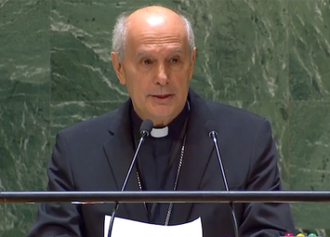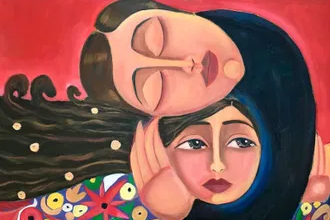Archbishop addresses UN on elimination of racial discrimination

Archbishop Caccia delivers statement
Source: Holy See
Archbishop Gabriele Caccia, Permanent Observer of the Holy See to the United Nations, addressed the General Assembly during the Commemorative meeting yesterday, to mark the International Day for the Elimination of Racial Discrimination.
In his remarks, Archbishop Caccia stated that racism is based upon the distorted belief that one person is superior to another, which starkly contrasts the fundamental principle that human beings are born free and equal in dignity and rights. He asserted that racism, a "crisis in human relationships," can manifest itself either explicitly or on a deeper level, as racial prejudice. The crisis in human relationships resulting from racial prejudice, Archbishop Caccia said, can be countered by the promotion of a culture of encounter, solidarity, and authentic human fraternity.
Archbishop Caccia concluded his comments by expressing the Holy See's concern for the racism and racial prejudice sometimes directed against migrants and refugees.
The full text of the statement follows:
Statement by HE Archbishop Gabriele Caccia,
Apostolic Nuncio, Permanent Observer of the Holy See to the United Nations at the Commemorative meeting to mark the International Day for the Elimination of Racial Discrimination
New York, 21 March 2023
Mr President, Excellencies,
The Holy See is pleased to participate in this commemorative meeting to mark the International Day for the Elimination of Racial Discrimination and take the opportunity to reiterate its strong condemnation of racism and racial discrimination.
Racism hinges upon the distorted belief that one person is superior to another, standing in stark contrast with the fundamental principle that "all human beings are born free and equal in dignity and rights."[1] Despite the commitment of the international community to eradicate it, racism continues to reemerge. It is as if it were "a virus that quickly mutates and, instead of disappearing, goes into hiding, and lurks in waiting."[2] Instances of racism still plague our societies resulting in what Pope Francis called "a crisis in human relationships."[3]
This crisis unfolds at different levels. On the surface, racism shows itself in discriminatory actions that are based on the false assumption of racial superiority. Overt racism is often identified and condemned. In this regard, Governments are called to enact legislations that address such instances.
At a deeper level, however, racial prejudice can be embedded in all aspects of society. It may be less evident, nonetheless, it exists. It is present in those inequalities which are encouraged and used, sometimes even at the institutional level, to disadvantage and harm certain people solely on the basis of their race. In this regard, the crisis in human relations resulting from racial prejudice can be effectively countered by the promotion of a culture of encounter, solidarity and authentic human fraternity.
To speak of such culture does not mean simply to live together and tolerate one another. Rather, it means that we "should be passionate about meeting others, seeking points of contact, building bridges, planning a project that includes everyone."[4] Building such a culture is a process that stems from recognizing the unique perspective and invaluable contribution that each person brings to society. Each person has "a particular richness and perfection in the manner of his [or her] being,"[5] rooted in his or her inherent dignity and regardless of race. Only the recognition of human dignity can make possible the common and personal growth of everyone and every society. To stimulate this kind of growth it is necessary in particular to ensure conditions of equal opportunity for men and women and guarantee an objective equality between all human beings.[6]
Mr President,
The Holy See also wishes to express its concern for the racism and racial prejudice sometimes directed against migrants and refugees. Many hope to find new opportunities for themselves and their families, as they flee from war, persecution and natural catastrophes.[7 ]In this regard, a change of stance towards migrants and refugees is needed on the part of everyone, "moving away from attitudes of defensiveness and fear […] towards attitudes based on a culture of encounter, the only culture capable of building a better, more just and fraternal world."[8]
Thank you.
[1] Universal Declaration on Human Rights, Article 1.
[2] Cfr. Pope Francis, Encyclical Letter Fratelli Tutti, 97.
[3] Pope Francis, Address to the Members of the Diplomatic Corps Accredited to the Holy See, 8 February 2021.
[4] Pope Francis, Encyclical Letter Fratelli Tutti, 216.
[5] Cfr. Pope John Paul II, Love and Responsibility.
[6] Cfr. Compendium of the Social Doctrine of the Church, 145.
[7] Cfr. Pope Francis, Encyclical Letter Fratelli Tutti, 37.
[8] Pope Francis, Message for the World Day of Migrants and Refugees, 2014.















